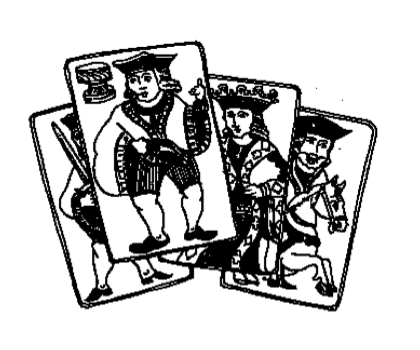Card makers in 15th-century France drew their kings to look like real kings and emperors. So James McManus tells us in Positively Fifth Street, his tall and enthralling tale about the time he almost won the 2000 World Series of Poker. Their king of spades showed David, King of the Hebrews, with Goliath’s sword in hand and a slingshot at his feet. Their king of hearts was Alexander the Great, diamonds was Julius Caesar, and clubs was Charlemagne. However, McManus writes, “as standard playing cards became double-ended, designers had to jettison the heraldry on the lower halves of the court cards. King David’s slingshot disappeared, making his kingship more generic.” Also lost to us are the Maid, Valet, and Dancing Girl who, in certain decks, took the place of today’s eight, nine, and ten (although McManus will turn back the clock and compare an erotic dancer caught in a deadly ménage à trois to the ten of clubs because of the ten’s “black three-belled flowers, emblematic of an unholy trinity, adorning the bare-breasted lap-dancer” and because she is a ten “in the Bo Derek sense”).
What happened to these cards, and where did David’s slingshot go? Today a deck sold by Hoyle and used by many of the estimated 70 million poker players in America contains neither a slingshot nor dancing girls, but does find room for an orb of Christendom in the left hand of the king of clubs and a three-belled flower in the left hand of his queen. History being written by the victors, Hoyle’s deck can be read as a victory for Christendom in the same way that Saddam Hussein is now the ace of spades in George W. Bush’s fifty-five-card most-wanted list and not the other way around—a victory which sets the king and queen and Christendom up for two falls in Positively Fifth Street. An ace beats a king or queen. This was not always so. McManus suggests that the ace made the switch from low to high rank during the American and French revolutions when “it suddenly became possible for the merest commoner to become emperor, prime minister, or president” and, I would add, possible to build a small, frail wall between church and state. Second, McManus was an altar boy in a church where the altar boys trumped their priest’s call of Dominus Vobiscum by responding “You’re damning us, Nabisco” (one of the better puns in the book, given that young Jim’s taste for whole cream on his cereal and Hershey Bars after lunch becomes, in later life, a taste for “Prozac and trazodone and Zocor with booze every night”). If McManus is damned then ...
You have reached your article limit
Sign up for a digital subscription and continue reading all new issues, plus our entire archives, for just $1.50/month.
Already a subscriber? Sign in





